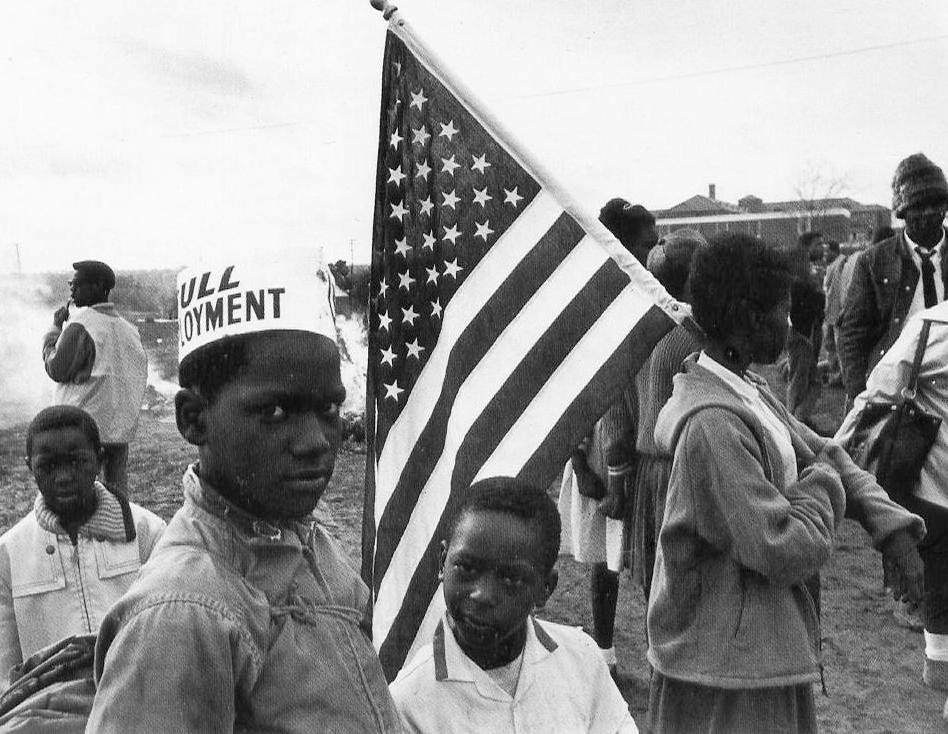
Economics: Free Market Capitalism--Government Role

Figure 1.--These black youths are involved in a Civilis Rights march in Alabama during the 1960s. Notice the boy's cap reading 'Full Employment". The Civil Rights Movement in America for many years focused on segregation (schools and public accomodations) and eventually voting rights. A primary concern was also jobs which most directly affected people's livlihood. Jobs were different than the other issues in that they were not as directly amenable to government action. Most jobs in America were and continue to be created by the private sector. Most black Americans sided with the Democrats and the prevailing liberal view that the Government can create jobs and that Government action to do so can have a beneficial impact on the economy. Few black Americans appear to accept the conservative contention that diverting resources from the private sector to the governmrnt acts to supress economic activity and job creation in the private sector. This of course is a matter of opinion, but what is demobstrable is that despite decades of effort and billions of dollrs spent on Federal anti-poverty efforts, a huge gap persists in enployment statistics. Black unemployment continues to be about diubke white unemployment rates. Black youth unemployment is especially severe. And this gap has continued even during the Obama Presidency and his 'progressive' policies.
|
|
One of the most contoversial aspects of modern ecomomics is the appropriate role of government. Capitalism proved so sucessful because the mechanism of the free market is superior to any efforts by governmental authorities to manage the economy. This was at the heart of America's rise and the failure of the Soviet Union. As a result, at the same time capitlism appeared, the phase laissez faire began to be used describing the essential government policies to ensure the proper functioning of the free market. It came to encapsulate an economic system in which commercial transactions between private parties are left free from government restrictions (tariffs, royalties, monpolies, subsidies, mandates, laws, regulations, etc.). The French phrase 'laissez-faire' literally means 'let [them] do', impling 'let them do as they want' or something like 'hands off'. The origins are disputed, but some believe the phtrase was first used in a meeting between the famed Louis XIV's brilliant finance minister, Jean-Baptiste Colbert, and a group of French businessmen led by a certain M. Le Gendre (about 1681). Colbert with all his brilliance was not a capatalist, one reason that England/Britain would be able to contain French power. Colbert was a mercantilist who like other royal officials believed in Government managment and direction of the economy. A solicitius Colbert asked the asembled businessmen how the French state could assist them and help strengthen French commerce. M. Le Gendre replied directly, 'Laissez-nous faire'. In the next century and a half of conflict with Britain, the French weakpoint was its failure to embrace capitalism and the free market. Of course laissez-faire and Adam Smith's subsequent blue print never meant that there was no role for government. In fact government is vital in the functioning of a capitalist state. The Government has to protect property rights, create a stable currency, prevent unfair behavior and larceny, and regulate the market to insure that all participants are treately fairly. What it should not do if the market is to operate efficently is to intervene to pick and choose winners and to attempt to control outcomes. The idea that the Government should never intervene can have disasterous results. One of the most obscene such incidents of governmental irresponsibility was the dececission by Liberal Lord John Russell,based on his belief in the principle of laissez-faire to close the food depots that were feeding the starving Irish during the Potato Famine--millions died as a result. The failure of Government to refulate markets can lead to illegal activity and felonious market manipulation. Some of this was involved in the Wall Street Crash playing a role in the Great Depression (1929). On the other hand, excessive Government interbention in the market can also have adverse onsequences. There is considerable evidence that the News Deal polcies actually prevented the economic recovery from the Great Depression. Several decades of intervenist Socialist policies in the onece dynamic European economies have led to declining innovation, stagnant growth, declining incomes, high unemployment, cuts in entitlement programs, and bankuptsy.
Sources
CIH

Navigate the Children in History Website:
[Return to the Main market capitalism page ]
[Return to the Main modern industrial era economics ]
[Return to the Main Economics Page ]
[Introduction]
[Animals]
[Biographies]
[Chronology]
[Climatology]
[Clothing]
[Disease and Health]
[Economics]
[Geography]
[History]
[Human Nature]
[Law]
[Nationalism]
[Presidents]
[Religion]
[Royalty]
[Science]
[Social Class]
[Bibliographies]
[Contributions]
[FAQs]
[Glossaries]
[Images]
[Links]
[Registration]
[Tools]
[Children in History Home]
Created: 6:05 AM 11/4/2014
Last updated: 7:18 AM 11/4/2014



